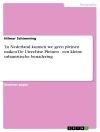Project Report from the year 2015 in the subject Urban and Regional Planning, grade: Good, University of Stuttgart (Master of Infrastructure Planning), course: Case study, language: English, abstract: The County of Ludwigsburg, with the City of Ludwigsburg as its capital, is located at the core of the State of Baden-Württemberg and forms part of the Stuttgart Region. It consists of 39 administrative municipalities with a total population of 516, 874 inhabitants as at 2009. It is anticipated that the County will experience additional population growth of approximately 21, 400 in the year 2020. This has profound implications for spatial change and reorganization as more land would be required for housing and jobs allocations and other complementary functions. The principal objective of this project is the effective regional planning and sustainable urbanism in the County of Ludwigsburg and it is accomplished in three main phases.
Phase one focuses on the formulation of objectives and development of planning guidelines and spatial concept based on data analysis of the existing situation considering issues such as demography, economic and environment among others. The analysis of the existing situation also revealed the strengths, weaknesses, opportunities and threats of the county resulting in the definition of specific objectives, namely: ensuring ecological friendly urban planning; improving non-motorized modes of transport; ensuring the effective and efficient utilization of open spaces and promoting a sense of social cohesion; and promoting compact development. The planning objectives form the basis of the planning guidelines which in turn provide the framework for the allocation of jobs and housing within the county.
In the second phase, an elaborate land demand calculation as well as land suitability analysis on the county level were undertaken using some defined benchmarks and indicators based on which the jobs and housing allocation scheme was prepared. In order to ensure spatial harmony and enhance optimal utilization of the limited space, a spatial prioritization of the planned interventions was carried out in line with the spatial concept and planning guidelines.
Phase three consists of a set of activities that culminated in the design of a detailed urban master plan together with implementation plan to cater for 5000 inhabitants on one location in a green field. Cumulatively, this urban master plan will provide a comprehensive framework for pursuing the development agenda of the county.
Om författaren
Biographical Notes
• Master in Infrastructure Planning Sep 2013-Sep 2015
• Bachelors in Architecture
• Lecturer at N.W.F.P UET Peshawar Abbottabad campus Pakistan May 2012-Aug 2013
The cities in our country have no regular boundaries, and the expansion of these cities is not managed, which is an alarming situation. As an architect, I want to manage urban growth with sustainable solutions.












